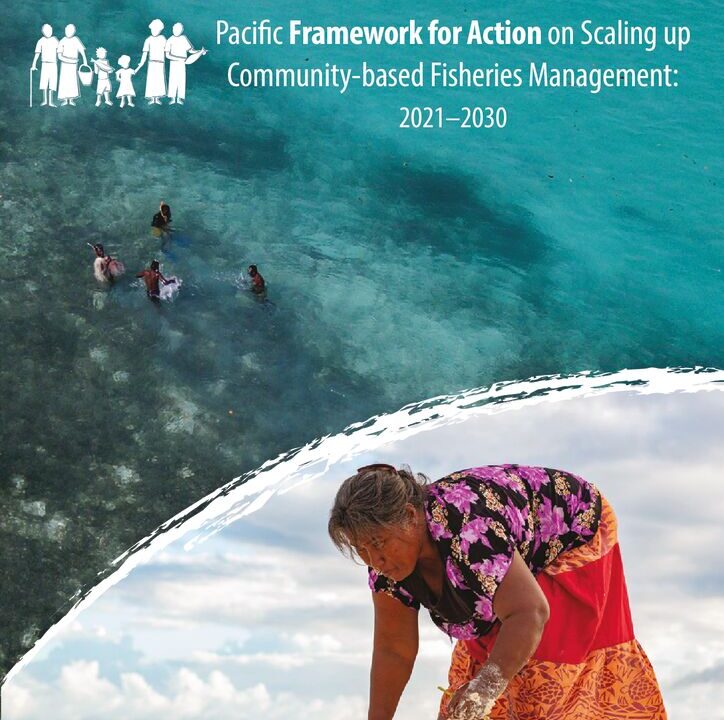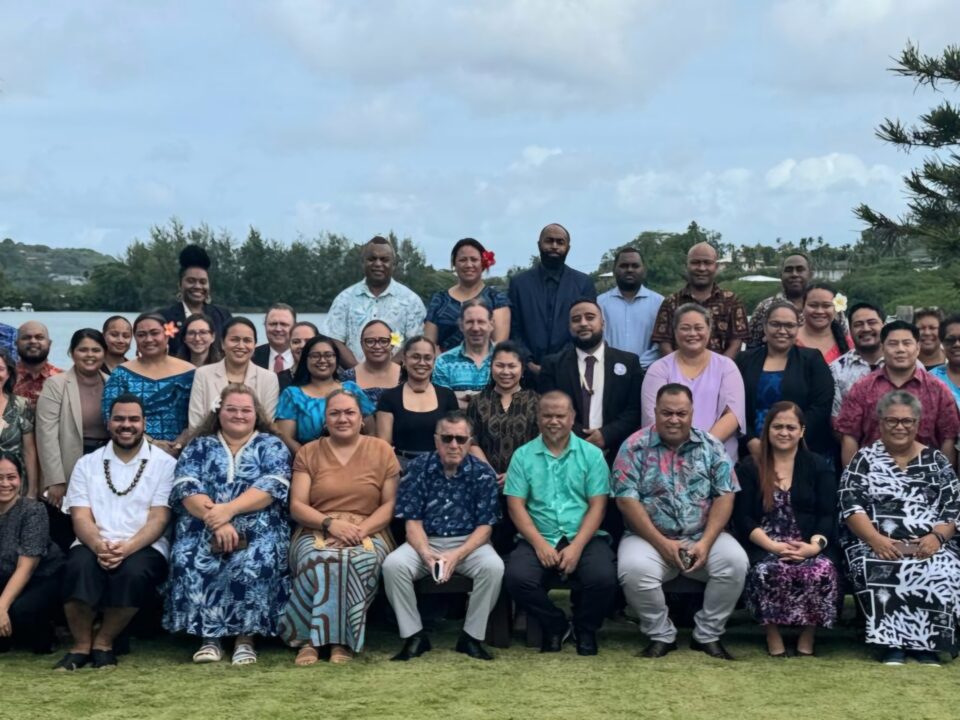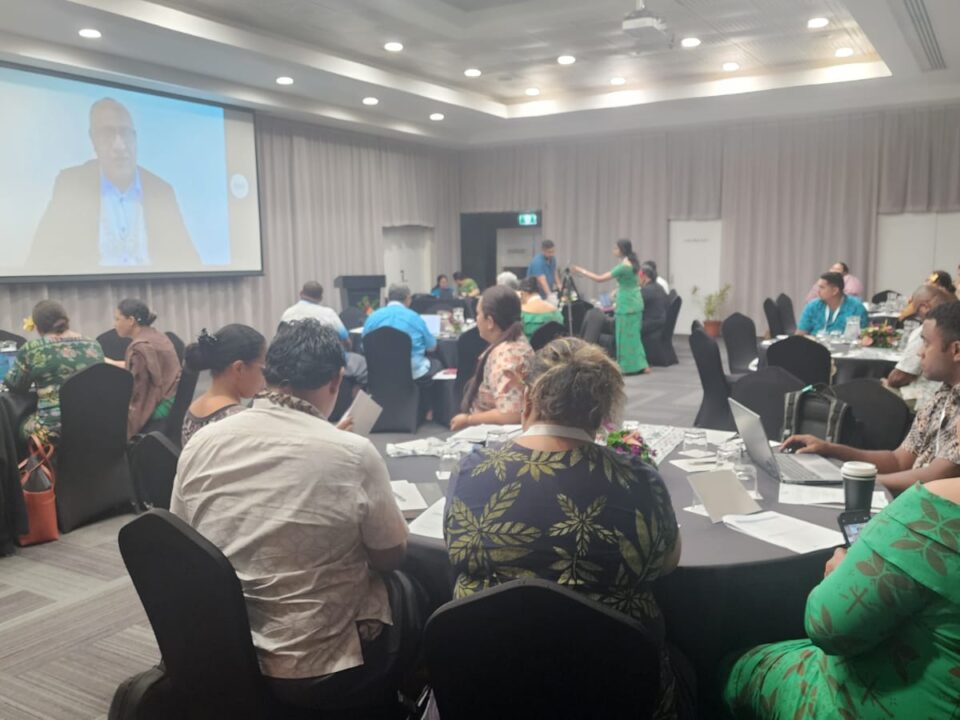
Back (L-R): Minister for Niue Hon. Esa Mona Ainuu, Special Ocean Envoy, H.E Peter Thomson, Minister for Palau, Hon Steven Victor, UAE Director General for COP 28, Ambassador Majid Al Suwaidi, OACPS Assistant Secretary-General, Cristelle Pratt
Front (R-L): Pacific Ocean Commissioner & PIF Secretary General, Henry Puna., US Special Presidential Envoy on Climate, John Kerry, Cook Is Secretary of Foreign Affairs, Ms. Tepaeru Herrmaan
In a sea of climate disappointment, the ocean must take centre stage in all future climate discussions
Op-Ed by Mr Henry Puna
Pacific Ocean Commissioner and Secretary General, Pacific Islands Forum
This year, our Leaders endorsed the 2050 Strategy for the Blue Pacific Continent, setting out our collective approach to achieving sustained security, development, and prosperity for all peoples in the Pacific.
In charting this ambitious course, our Leaders are well aware that climate change remains the single greatest threat to our livelihoods, sovereignty, and existence, and is therefore the greatest obstacle to the achievement of our ambitions and aspirations as set out in the 2050 Strategy.
It is for these reasons that we the Pacific turned up in numbers to COP 27 in the desert surrounds of Sharm El Sheikh this year, a world away from the oceanscape that we call home. It is why we continued to urge for global warming to be maintained at 1.5 degrees with a strategy increasingly focused on seeking the urgent reduction of greenhouse gas emissions, including through the transition away from fossil fuel usage and production.
It is why we continued to push for climate change finance – so that our vulnerable island environments and our infrastructure can adapt to climate change impacts that are not of our doing.
And it is why we are now cautiously optimistic about the landmark hard-fought deal to create a fund on ‘loss and damage’ in the COP27 outcomes, though we know that there is much work left to do.
But beyond these more widely reported issues to emerge from COP27, there is one matter that I am particularly interested in, a matter that gives me some cause for hope amidst the mixed results and progress that we are all too familiar with in regard to the UNFCCC process. That matter is the ocean.
Ocean – Climate Nexus
As an African COP hosted by Egypt, one may have thought that land-based issues may have dominated the discussion; however, there was a significant emphasis on the ocean this year. For instance, there was for the first time a standalone ocean pavilion; countless ocean side events from across the world – including an event convened by my own Pacific Islands Forum Secretariat in which US Senator and Climate Envoy John Kerry took part; and of course, the ocean was progressively recognized in the COP27 outcomes.
These developments indicate that the global policymaking community in the climate space now sees what we in the Pacific have long known and fought for: that our climate and our ocean are inseparable and one cannot be considered without the other.Sheer facts bear this out: The ocean covers 70% of the planet; absorbs 30% of global CO2 emissions, and takes up over 90% of the heat from global warming; while also producing over 70% of the earth’s oxygen.
If we take stock of these numbers alone it is crucial that we look at global climate change and ocean policy holistically – as those in the scientific community have done so for years. And in this respect, and from my vantage point as Secretary General to the Pacific Islands Forum and Pacific Ocean Commissioner, I am advocating to further elevante focus on the ocean within the global climate discourse as we head into COP28., as I did in discussions with the COP27 Presidency, and representatives from the incoming COP28 Chair while in Egypt.
Ocean and the UNFCCC process
In fact, the Pacific has called for the inclusion of the ocean in climate discussions for years, but only recently have these calls progressed with the inclusion of the ocean in UNFCCC discussions at COP26 last year, and subsequently, amore progressive decision on the ocean at COP27 this year. But more is required, in particular, how the region can continue to demonstrate leadership through the co-facilitation of the ocean-climate dialogue each year..
But there is scope to better define the oceans-climate nexus, and to understand what measures need to be taken to protect the ocean so that it provides critical environmental services, including to regulate our climate. There is also opportunity to better embed the climate-oceans nexus, including by ensuring an annual dialogue on the issue to be tangibly taken forward on to the COP agenda each year, with reports of the ocean and climate dialogue considered by the COP on an annual basis as decided by COP27.
These inclusions will require united and refined advocacy from our Members at a political and officials level, particularly if we are to ensure oceans is considered at COP28.
The Continued Potential of the Ocean
At the heart of the 2050 Strategy is recognition that our ocean geography, ocean resources, and ocean identity are central to our future wellbeing and security. This is partially based on the fact that the ocean contributes $1.5 trillion annually to the global economy – a figure which is expected to double to 3 trillion by 2030.
And now we can add to this the role of the ocean in regulating our climate. In this respect, integrated ocean planning approaches now take on an increased level of importance in the climate context.
As our member countries continue to advance their integrated oceans management plans, some are including quantifiable measurements for marine carbon sequestration, because a stronger focus on the nexus between climate and ocean remains essential to harness the potential of the Blue Economy.
At the same time, there is growing recognition of the role of nature and ocean-based solutions. For the Pacific, the very concept and recognition of our Blue Pacific Continent draws from “nature and ocean-based solutions”, as the largest ocean in the world.
And in a broader sense, a key strategic and policy question for us remains: what is the full value proposition of the Blue Pacific Continent? And how do we then convert the significant ecosystem service that our Blue Pacific collectively provides to the world into tangible benefit for the stewards and protectors of this very ocean?
Looking Forward: A Climate-Ocean Agenda
Pacific conservation initiatives demonstrate that our region is carrying the burden of maintaining oceans health on the world’s behalf. In many ways, the actions of our Pacific Island Countries on oceans go unnoticed at global level, while investment opportunities and flows seem to pass over us for the African, Latin American and Caribbean regions.
Developed countries from the north must be reminded that they need to also do their part and step up and resource oceans conservation – particularly in light of the ocean’s function in regulating the sorts of climate impacts that many developed countries are historically responsible for.
Resourcing and financing, if provided at scale, could be used to support other ocean-based climate actions that the Pacific could take up collectively as region wide initiatives such as renewable energy, decarbonizing ocean industries and protecting coastal ecosystems. On marine conservation, we are advocating what we are doing nationally but not presenting ourselves collectively to provide the global audience context as to the tremendous amount of effort our countries have put into conserve parts of the total 42million square kilometers of the Blue Pacific Continent.
As we move forward under the 2050 Strategy, we must continue to push for a greater oceans focus in the UNFCCC process, starting with creating a unified regional ocean-climate action agenda that our countries can collectively pursue to address climate change. And in that context, it is important that we receive due recognition for the contribution that we make towards the mitigation of the causes and impacts of climate change.
Otherwise, our considerations and discussions in regards to, climate change will remain as they do today: short sighted and frustrating.
-ENDS-



